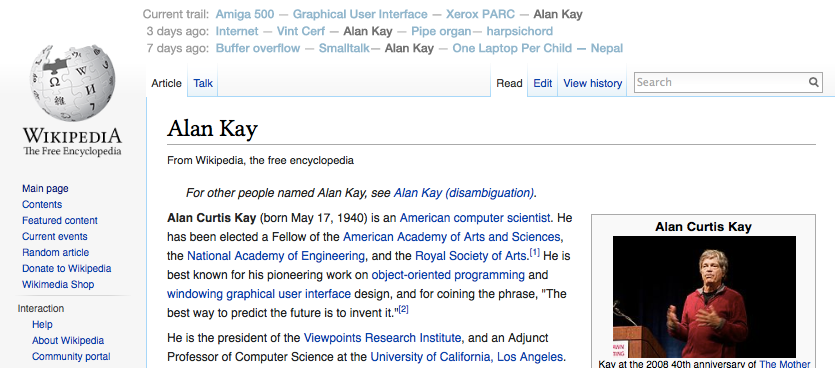On Wikipedia (or anywhere on the web, really), I've wanted there to be a set of backlinks and forward links, for every time you've been to the page, to depict the memex-style trail that you were chasing at the time. I think this would help contextualize the knowledge, by associating it with past trains of thoughts. You would also want this sort of information called out around the links in the body of the article, as Glen showed.
You could obviously go much further with visualizing and navigating ("flying around") such trails.


On Nov 18, 2014, at 12:44 AM, Glen Chiacchieri wrote:
I just realized that on most sites, links you've already visited are greyed out or desaturated, often to the point where you can't even tell the difference between text and a link:
<Screenshot 2014-11-17 22.55.07.png>
But this seems sort of backwards. If you're coming across a novel wikipedia page, for example, then what you might be asking is "how does this new thing fit with what I already know?" and you might want to see those relations highlighted.
I made a little "bookmarklet" that highlights links you've already visited on wikipedia in green. I kind of like it:
<Screenshot 2014-11-17 22.44.11.png>
(also see the attached video, though I don't know why the text is fuzzy)
Just paste this into your url bar on any wikipedia page to get green visited links:
javascript:(function()%7Bvar body %3D document.querySelector('body')%3Bvar styleNode %3D document.createElement('style')%3Bvar cssTextNode %3D document.createTextNode('%23content a%3Avisited %7B color%3A rgb(41%2C 229%2C 41) !important%3B %7D')%3BstyleNode.appendChild(cssTextNode)%3Bbody.appendChild(styleNode)%7D)()
(in safari and chrome it seems to misbehave a little. let me know if you have any problems)
I like this idea of getting to know a new thing by starting with its relations to things you already understand. Seymour Papert had a good bit about this in Mindstorms:
For me, getting to know a domain of knowledge is much like coming into a new community of people. Sometimes one is initially overwhelmed by a bewildering array of undifferentiated faces. Only gradually do the individuals begin to stand out. [...] Similarly, when one enters a new domain of knowledge, one initially encounters a crowd of new ideas. Good learners are able to pick out those who are powerful and congenial. Others who are less skillful need help from teachers and friends. But we must not forget that while good teachers play the role of mutual friends who can provide introductions, the actual job of getting to know an idea or a person cannot be done by a third party.
Not that having been to a page means you understand it, but it's a start.
You might imagine that books you pick up, instead of hiding the references in endnotes, have highlighted passages that call out references to things you've already read—these sections could even be more salient the more you've read a particular book.
You might also imagine that if you reading history was tracked, then you could share that history with friends or colleagues. Going to a new wikipedia page could highlight not just the things that I know about, but the things Bret knows about, or even things that anyone in CDG knows about.
More on this later...
-Glen
<wistory.m4v>